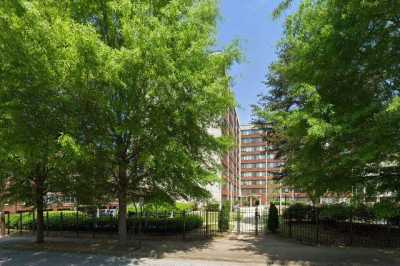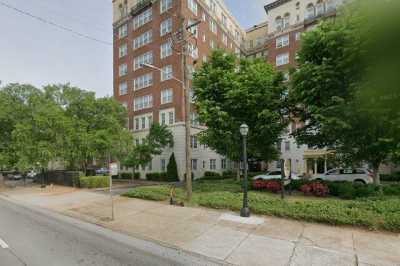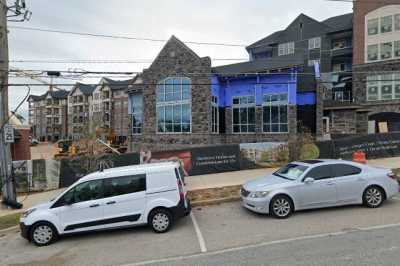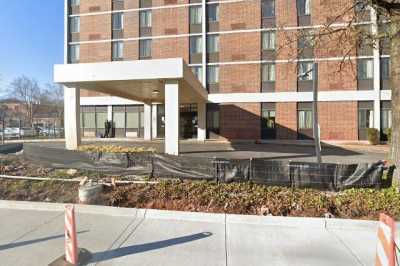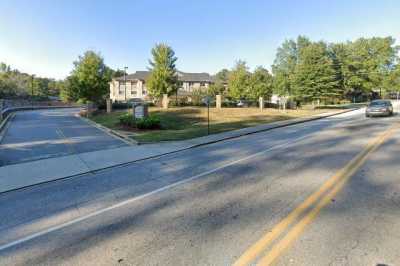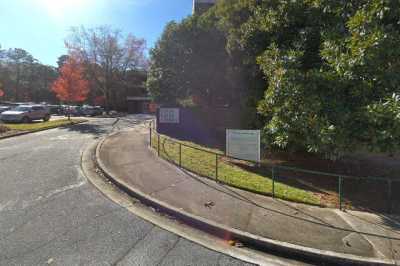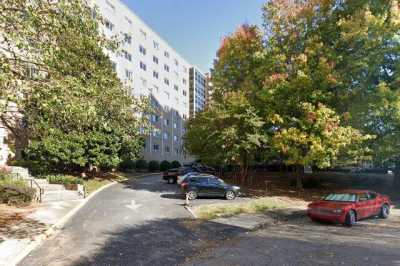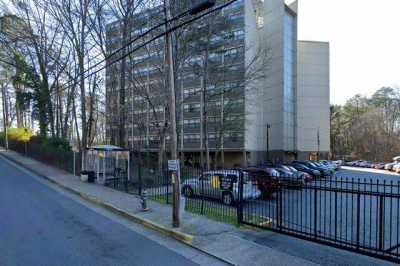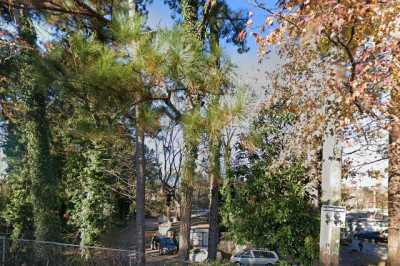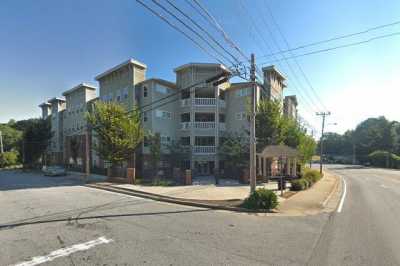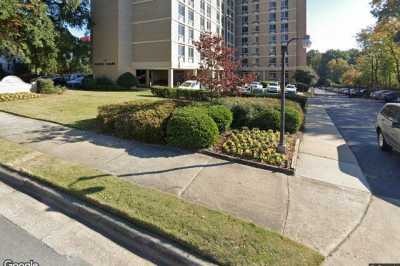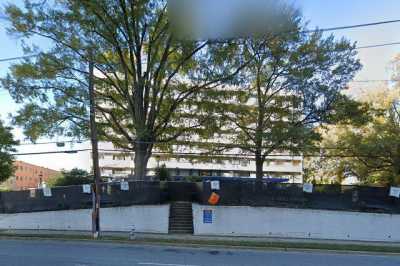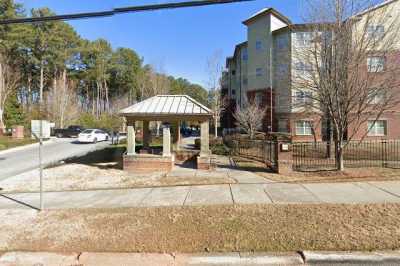
Life is peachy keen for active seniors in Atlanta. Among the city’s most attractive assets are the nearly year-round mild weather, lush parks and green spaces, and world-renowned hospitals. To top it off, the city is a hot spot for cultural events, mouthwatering dining options, and world-class shopping. Retirees will find the Big Peach always has something fabulous to do, and there are a wealth of senior living options where they can spend their golden years thriving while enjoying a maintenance- and hassle-free lifestyle.
A Place for Mom partners with 11 independent living communities within 10 miles of downtown Atlanta. These communities have all the benefits of apartment-style living while offering amenities and services, such as housekeeping, complimentary transportation, and laundry. This deluxe resource dives deep into independent living communities located within a 10-mile radius of the heart of Atlanta to cover the costs, amenities, and some of the local laws and regulations.
10 Best Independent Living Communities in Atlanta, GA
Life is peachy keen for active seniors in Atlanta. Among the city’s most attractive assets are the nearly year-round mild weather, lush parks and green spaces, and world-renowned hospitals. To top it off, the city is a hot spot for cultural events, mouthwatering dining options, and world-class shopping. Retirees will find the Big Peach always has something fabulous to do, and there are a wealth of senior living options where they can spend their golden years thriving while enjoying a maintenance- and hassle-free lifestyle.Read more
A Place for Mom partners with 11 independent living communities within 10 miles of downtown Atlanta. These communities have all the benefits of apartment-style living while offering amenities and services, such as housekeeping, complimentary transportation, and laundry. This deluxe resource dives deep into independent living communities located within a 10-mile radius of the heart of Atlanta to cover the costs, amenities, and some of the local laws and regulations.
Atlanta Independent Living Facilities | 1073 Reviews
They are excellent. The staff is friendly, and they keep it very clean. The advertising on the pricing was a little unclear, and misleading. They have quite a few activities. I liked that it was nice and...
Our free advisors can help
- Compare local facilities
- Determine care type
- Schedule tours
- Evaluate pricing
My Mom loves living here! She can use her walker to go to Publix, Barnes & Noble, Starbucks and more! That is independent living! The staff is absolutely amazing, the apartments are lovely, and there are...
At the beginning of [date removed], my aunt had the opportunity to move from [removed] to Calvin Court Georgia. The staff helped us with the paperwork, making it simple for her to move in right away. What a...
- What families are saying about independent living in Atlanta
- Costs of independent living in the Atlanta area
- How people pay for independent living in Atlanta
- Understand Georgia laws and regulations for independent living communities
- Get to know independent living in Atlanta
- What to expect from independent living in the Atlanta area
- Explore senior care with confidence
- New to Atlanta? Highlights for seniors
What families are saying about independent living in Atlanta
Recent reviews for independent living in Atlanta
Oaks at Stockbridge
Decatur Christian Towers
The Mansions at Sandy Springs Senior Independent Living in Peachtree Corners, GA
Costs of independent living in the Atlanta area
The average cost of independent senior living in Atlanta is $3,623, according to A Place for Mom’s proprietary data.[01] This figure most accurately reflects what families paid in 2022 and takes into account the cost of rent, as well as any extra care costs, optional services, and fees for expenses, like the following:
- Monthly pet fees
- Monthly parking fees
- Initial community entrance fee
At first, you may think it’s less expensive to continue living in your home than to move into an independent living community. An independent living community may cost more than rent at a dedicated senior apartment complex, but you’re also getting access to more services you wouldn’t otherwise have.
Think of an Atlanta independent living community as an all-inclusive resort. You’ll pay a monthly amount to live there, but it also includes various perks, such as the following:
- Dining services
- Housekeeping
- Personal laundry
- Transportation services
- Utilities, maintenance, and landscaping
- Social activities and community outings
- Access to on-site amenities (fitness facilities, pools, beauty salons, lounge areas, and more)
When visiting different communities, be sure to ask about what is included in the baseline rent to avoid adding any optional services that aren’t needed or wanted. Below, you’ll find the starting costs for Atlanta independent living communities before those extra items and fees are included.
Average monthly cost of Independent Living in Atlanta, GA vs. nearby cities
Atlanta, GA
How people pay for independent living in Atlanta
Paying for an independent living community works a lot like renting an apartment, with personal funds primarily being used to foot the bill. While some resources may be available to eligible veterans, other sources of public funding like Medicare, Medicaid, and long-term care insurance are generally not available to cover rent in an independent living community. However, some medically necessary in-home care services may be covered by Medicare and Medicaid, which we detail below.
Many seniors and their families will choose to dip into their personal funds to pay for an independent living community. These are often funds that have been built up over time and can include sources of retirement income, such as Social Security benefits, pensions, and an IRA or 401k.
Georgia’s tax-friendly policies make these funds especially advantageous for senior residents. The Peach State doesn’t tax Social Security benefits and has special deductions for all retirement income:
- $35,000 for residents aged 62-64
- $65,000 for residents age 65+[02]
Seniors who own property or have a life insurance policy may be able to use these additional options to fund a transition into an independent living community:
The Georgia Department of Veterans Services (or GDVS) has state benefits available for veterans, which include tax exemptions on military retirement income. Eligible Atlanta veterans may also be able to receive federal benefits through the Department of Veterans Affairs (or VA). Veterans age 65 and over can collect supplemental income through the VA’s pension program if they meet the service and financial requirements.
VA pensions
VA pension benefits are supplemental monthly income that’s paid to qualified veterans and their surviving spouses. These monthly payments can be put towards the cost of an independent living community in Atlanta. A veteran must meet VA service and financial requirements to be eligible, as well as at least one of the prerequisites:
- The veteran must collect Social Security Disability Insurance (SSDI) or Supplemental Security Income (SSI).
- The veteran must have a permanent disability, which means it’s unlikely to ever go away.
- The veteran must be a patient in a nursing home because of a mental or physical disability.
- The veteran must be age 65+.
Aid and Attendance
The VA Aid and Attendance benefit can provide extra monthly payments on top of a disabled veteran’s monthly pension. This add-on benefit can be used to pay for anything that helps improve a disabled veteran’s quality of life, which can include the cost of an independent living community. To qualify, veterans must already receive a VA pension, be enrolled in VA health care, and meet at least one of the requirements below:
- Have poor eyesight
- Need help with daily activities
- Spend all or most of the day in bed because of an illness
- Live in a nursing home because of a physical or cognitive disability
Housebound Allowance
The Housebound allowance is another benefit that can be added to a monthly VA pension amount for disabled, housebound veterans. This benefit is mainly intended for veterans who can’t leave their home — or independent living community in some cases — because of a permanent disability. Unlike Aid and Attendance, the Housebound allowance is specifically used to pay for in-home care services. Veterans can’t receive the Housebound allowance while also receiving Aid and Attendance.
Veterans can apply for Aid and Attendance or the Housebound allowance by completing VA Form 21-2680. Keep in mind that applying and getting approved for VA benefits can be a trying process to go through, but reaching out to local resources can help make it go much more smoothly. The Georgia Department of Veterans Services (or GDVS) provides benefit assistance services to veterans and their families. You can also utilize resources from local organizations, such as Catholic Charities of Atlanta, Veterans of Foreign War (VFW), and Disabled American Veterans (DAV).
The population of veterans living in Atlanta, per the U.S. Census Bureau
About 60% of veterans in Atlanta are age 55 and older, according to the U.S. Census Bureau.
Resources for Atlanta veterans
Georgia Department of Veterans Services (GDVS)
Find a Veterans Field Service Office near you.
2 MLK Jr. Drive, SE
Atlanta, GA 30334
Phone: 404-656-2300
Atlanta VA Regional Office
For help with applying for VA benefits
1700 Clairmont Road
Decatur, GA 30033
Phone: 404-929-6000
Hours: Monday through Friday, 8 a.m. – 4 p.m.
Catholic Charities of Atlanta
Veterans Support Services
Phone: 678-426-5804
Email: Help@ccatlanta.org
Veterans of Foreign Wars (VFW)
Find a VFW post
4952 Columbus Road
Macon, GA 31206
Phone: 478-474-3737
Hours: Monday through Thursday, 8 a.m. – 4 p.m.
Disabled American Veterans (DAV) office
Find your local DAV office
1700 Clairmont Road
Decatur, GA 30033-4032
Phone: 404-929-5956
Georgia’s Medicaid program can’t be used to pay for the monthly rent at an independent living community in Atlanta. Medicaid can be used to pay for home health services if a senior has a medical need for it and wants to receive care while living in the independent living community.
Georgia Medicaid’s Home and Community Based Services (or HCBS) waiver programs give eligible seniors the option to receive long-term care services in their home or independent living community rather than an institutional nursing home. Read on to learn more about what services may be available for you and how to apply for them.
Elderly and Disabled Waiver Program
The Elderly and Disabled waiver program (E&D) — previously called Community Care Services Program (CCSP) — and Service Options Using Resources in a Community Environment (or SOURCE) are two of Georgia’s main Medicaid waiver programs. These programs can be used to pay for some home health services from a person’s home, which can be in an independent living community.
Both programs offer a set of standard services that may include the following:
- In-home skilled nursing
- Care coordination
- Emergency response support
- Respite care
- Help with everyday tasks
- Home-delivered meals[04]
You can contact the Georgia Department of Community Health or your local Area Agency on Aging below for more details about Georgia’s Medicaid waiver programs. You can find and submit applications for Medicaid and other benefits on the Georgia Gateway website.
Atlanta resident Medicaid resources
Contact DCH
2 Peachtree St., NW
Atlanta, GA 30303
Phone: 404-656-4507
Area Agency on Aging — Atlanta
229 Peachtree St., NE, Suite 100
Atlanta, GA 30303
Phone: 404-463-3333
Medicare won’t pay for the cost to live in an Atlanta independent living community. Seniors may be able to receive Medicare-approved home health services while living in an independent living community if there’s a medical need for the services. These home health services may include the following:
- Medical supplies and equipment
- Occupational, speech, and physical therapy
- Home-health aide care
- Medical social services
- Skilled nursing care[05]
Seniors need to already be enrolled in Medicare Part A and/or Part B and have confirmation from a doctor that they meet one of the following prerequisites:
- The senior has a disability or illness that prevents them from leaving their home.
- The senior needs rehabilitative therapies to treat a specific condition.
- The senior requires constant skilled nursing care.[05]
Seniors can access free Medicare counseling through the Georgia State Health Insurance Program (SHIP) helpline. The program’s trained counselors can assist with Medicare benefits, enrollment, and financial assistance programs for out-of-pocket expenses. You can also access Medicare help by dialing 2-1-1 or by contacting your local Social Security office.
Atlanta resident Medicare resources
Division of Aging Services
2 Peachtree St., NW, 33rd Floor
Atlanta, GA 30303
Phone: 404-657-5258
Medicare assistance
Phone: 866-552-4464, ext. 4
Hours: Monday through Friday, 8 a.m. – 5 p.m.
Find your local Social Security office.
401 W. Peachtree St., NW, #2860
Phone: 800-772-1213
Other forms of public assistance exist besides Medicare and Medicaid. We highlight some additional options that can be used to help with the cost of an independent living community in Atlanta.
Housing vouchers
Seniors with low or fixed incomes may be eligible for the U.S. Department of Housing and Urban Development (HUD) Housing Choice Voucher (HCV) program, formerly called Section 8 vouchers. Qualified low-income individuals can pay a reduced rent to live at independent living communities that accept HCV, which can’t be more than 30% of a household’s monthly income.
The remaining rent is subsidized through the U.S. Department of Housing and Urban Development (HUD) and paid to the property owners through a public housing agency or another local source. Eligibility for the HCV is typically based on factors like a household’s size and income. Additionally, HCV recipients need to comply with the program’s rules:
- Adhering to all lease terms
- Reporting changes in income or house size
- Keeping the unit in suitable condition
It’s always a good idea to check with an independent living community directly to make sure they participate in the HCV program. You can apply by contacting the Housing Authority for the City of Atlanta — also called “Atlanta Housing” (AH) for short — or the Atlanta Department of Community Affairs.
Social Security benefits
Some Atlanta seniors may be eligible for Social Security benefits, which is a source of supplemental income that can be put towards any cost of living expenses. There are different Social Security benefits, each with its benefits and application processes. You can find more details about these options below.
- Social Security Disability Insurance (SSDI) is provided to individuals and certain family members who meet specific disability and work credit requirements.
- Social Security Survivors Pension helps a widow or widower of eligible workers and doesn’t require a disability.
- Social Security in Retirement (SSR or Social Security Retirement benefit) replaces some of a person’s monthly income if they retire or work less.
- Supplemental Security Income (also SSI) is intended to assist people who have a disability and don’t have work credits.
You can contact your local Social Security Administration office for help with applying for benefits.
Public assistance resources
Georgia Department of Community Affairs
Apply for the housing choice voucher program.60 Executive Park South, NE
Atlanta, GA 30329
Phone: 404-679-4840
Housing programs
230 John Wesley Dobbs Ave.
Atlanta, GA 30303-2429
Phone: 404-892-4700
Social Security office locator
401 W. Peachtree St., NW, #2860
Atlanta, GA 30308
Phone: 800-772-1213
Understand Georgia laws and regulations for independent living communities
Stand-alone independent living communities aren’t required to be licensed by the state or regularly inspected by any government entity.[06] Similar to senior apartment communities, there are certain housing and fire codes that need to be followed for safety purposes.
Communities that operate exclusively as independent living communities aren’t usually considered long-term care and don’t have the same regulations as assisted living, memory care, and skilled nursing facilities. However, independent senior communities that also offer assisted living or memory care in Atlanta will likely follow these regulations established by the Georgia Department of Community Health:
- Providing medication administration if requested
- Developing a written care plan within 14 days of a resident’s admission
- Providing social activities
- Preparing a minimum of three daily meals and offering options for special dietary needs[07]
The majority of independent living communities in Atlanta will likely have an age minimum requirement of 55+ or 62+. You’ll find that most independent senior living communities will also have admission requirements to make sure a potential resident doesn’t have care needs that go beyond what the community can provide.
Resident rights in independent living communities
Similar to a relationship between a tenant and landlord, the owners of independent senior living communities have to follow building and fire safety codes to provide a safe living space. You can expect all types of senior housing in Georgia to comply with the Fair Housing Act, which prevents properties from turning renters away because of the following:
- Family status
- Race
- Religion
- Sex
- Disability status
Independent senior living communities aren’t usually subject to the family status category because of the Housing for Older Persons exemption, which allows properties to meet the following guidelines to provide housing for specific age groups:
- Housing is meant for and only occupied by residents age 55+.
- Housing is intentionally designed to help older persons, per the state or federal program’s definition.
- Housing is intended for and exclusively inhabited by residents age 62 and older.[08]
The Americans with Disabilities Act (ADA) also aims to prevent housing discrimination, requiring landlords to make reasonable accommodations to a property to make it accessible to residents with disabilities. It also lets residents with disabilities make reasonable accommodations to their living spaces that help them use and enjoy their homes. Below are some examples of reasonable accommodations and modifications:
- Wheelchair ramps
- Widened doorways
- Lower light switches
- Hand rails and/or grab bars
Additional resources for Atlanta residents
Georgia Department of Community Health
Find more HFRD laws and regulations
2 Peachtree St., NW
Atlanta, GA 30318
Phone: 404-656-4507
HUD Atlanta Regional Office
Program Directory
Five Points Plaza Building
40 Marietta St.
Atlanta, GA 30303
Phone: 404-331-5136
COVID-19 regulations for Atlanta independent living communities
Atlanta independent senior living communities don’t have any COVID-19 mandates or restrictions in place as of February 2023, though some senior communities — especially those with more advanced care types — may continue to follow recommendations from the Centers for Medicare and Medicaid Services (CMS) and the Centers for Disease Control and Prevention (CDC).
Health resources
Georgia Department of Public Health
Georgia COVID-19 updates
2 Peachtree St., NW
Atlanta, GA 30303-3186
Phone: 404-657-2700
Fulton County Board of Health
10 Park Place, SE
Atlanta, GA 30303
Phone: 404-613-1391
Hours: Monday through Friday, 9 a.m. – 4:30 p.m.
The Georgia Department of Public Health (DPH) and Fulton County Board of Health regularly post COVID-19 status reports on their websites, along with information about vaccines and local testing sites. These are the recommendations on the DPH website, as of February 2023:

Masking. Everyone should wear a mask in public indoor spaces, especially if the community transmission level is high.

Vaccines. Everyone eligible for a COVID-19 vaccine should get one and stay up to date on boosters.

Quarantining. People who test positive for COVID-19 should follow CDC guidance for isolation.

Testing. Anyone who is symptomatic or exposed to someone with COVID-19 should be tested.
Get to know independent living in Atlanta
What to expect from independent living in the Atlanta area
Independent living communities in Atlanta come in all shapes and sizes, from high-rise buildings to residential charmers. You’ll find there are plenty of independent senior living options for all lifestyles throughout Atlanta’s sprawling metro.
Georgian-style residential
Often located a few miles outside of the lively downtown area, these communities offer a quieter setting for seniors who prefer a more leisurely way of living. With grand entrances, charming brick exteriors, and pillared columns, many of these quaint communities pay homage to Georgia’s historic mansions.
Lush landscaping and foliage surround these communities, where seniors can enjoy sipping sweet tea on outdoor patios, tend to raised garden beds, and unwind in delightful sunrooms. Several communities offer group outings and day trips, as well as on-site activities like gardening clubs and wine tastings.
Upscale independent living
Resort-style independent living awaits in these Atlanta communities. These luxury communities are typically in high-rise settings with unmatched city views. Lavish, tastefully decorated interior spaces welcome all and often include grand lobbies with ornate lighting fixtures and soaring ceilings.
You’ll find premium amenities, such as full-service salons, state-of-the-art fitness facilities, and swimming pools, offered at select communities. Indulge in exquisite chef-prepared meals, with expansive menu options and international cuisines offered in many communities.
Life-plan communities
Sometimes called Continuing Care Retirement Communities (CCRCs), life plan communities provide different tiers of care services on one campus. This often includes independent and assisted living, memory care, and/or skilled nursing. This can be a popular choice for seniors who want to age in place and not worry about their care costs increasing or having to move due to illness or health decline.
A large care service fee is typically charged upfront at life plan communities, with some seniors using proceeds from the sale of a home to cover the cost. This essentially guarantees a variety of care services are available to you within the campus, if and when such services are needed.
Explore senior care with confidence

Know where to start.
Identify the right care for your loved one with our free assessment.

See what you can afford.
Understand cost and payment for long-term care based on your loved one's needs.

Find top facilities for you.
Free, personalized guidance from our Senior Living Advisors can help you narrow your search.

Tour your favorite facilities.
Our free touring checklist can help you choose the right community.
New to Atlanta? Highlights for seniors
Number of Atlanta seniors age 65+, per the U.S. Census Bureau
Percentage of seniors age 65+ in Atlanta without a disability, as reported by the U.S. Census Bureau
The average retirement income received by seniors age 65 and older in Atlanta, according to the U.S. Census Bureau
Health care for seniors in Atlanta
Seniors in Atlanta have access to some of the best hospitals in the country, with some nationally ranking in specialties like neurology and cancer. You can find some of the Atlanta metro’s leading hospitals below.

Emory University Hospital
Emory University Hospital is part of the Emory Healthcare network and is the No. 1 hospital in Atlanta and Georgia. This general medical and surgical facility also serves as a teaching hospital. Emory University is nationally ranked for its performance in five specialties that include cancer, diabetes, and neurology. Emory University Hospital has received two Magnet recognitions for its excellent nursing proficiency and quality of care.

Emory St. Joseph’s Hospital
Emory St. Joseph’s Hospital (ESJH) is ranked as the second-best hospital in Atlanta and Georgia, and it is also part of the Emory Healthcare Network. ESJH is a general medical and surgical facility that’s highly recognized for its performance in conditions and procedures that include diabetes, chronic obstructive pulmonary disease (COPD), and back surgery.

Northside Hospital Atlanta
Northside Hospital Atlanta is ranked No. 3 in Atlanta and Georgia. This facility offers access to the most board-certified oncologists in the state, as well as the most advanced radiation therapy units in Georgia. Northside Hospital’s Atlanta campus is anticipated to add a groundbreaking radiation therapy system in February 2023 — the first of its kind available to cancer patients in Georgia.

Piedmont Atlanta
Piedmont Atlanta is the fourth-ranking hospital in both Atlanta and Georgia. The nonprofit medical facility offers primary care services, as well as heart care and innovative cancer therapies and treatments. It’s been nationally recognized for its brain tumor center, comprehensive cancer care, and heart and vascular services.
Transportation for seniors in Atlanta
Reliable transportation is essential to maintain one’s independence in Atlanta. About 96% of our partnered independent senior living communities in Atlanta offer complimentary transportation, but it’s important to be aware of what other options are available to help get wherever you need to go, whenever.[01] You’ll find several Atlanta senior transportation resources outlined below.
Atlanta’s primary public transit system is the Metropolitan Atlanta Rapid Transit Authority, or MARTA. One of the largest public transit systems in the United States, MARTA services nearly 400,000 passengers a day in the Atlanta metro via its bus and rail routes.[11] MARTA’s Red and Gold rail lines make getting to the airport a breeze with direct routes to the MARTA station in the domestic terminal Hartsfield-Jackson International Airport.
Seniors who are hesitant to travel on Atlanta’s public transportation alone can benefit from MARTA’s Travel Training Program. The program covers all the bases of how to navigate MARTA’s routes and travel independently. Additionally, discounted fare cards are available for seniors and Medicare cardholders that can be used on all of MARTA’s bus and rail lines. You can apply for a card by filling out a request for a reduced MARTA fare.
Empowerline is part of Georgia’s Aging and Disability Resource Connection (ADRC) network and has trained counselors available who can help you locate even more senior transportation resources near you. You can contact them directly by calling the number below or using the self-service online search tool. From there, you’ll simply follow these directions:
- Choose “transportation” from the category dropdown box.
- Select the specific transportation service you’re interested in.
- Find and pick your county.
Senior transportation resources in Atlanta
Empowerline
Find senior resources in Atlanta
Phone: 404-463-3333
Metropolitan Atlanta Rapid Transit Authority
2424 Piedmont Road, NE
Atlanta, GA 30324
Hours: Monday through Friday, 8:30 a.m. – 5 p.m.
Customer service: 404-848-5000
Despite the plentiful parks and green spaces, Atlanta is very much a car-reliant city. We’ve highlighted how Atlanta ranks for its walkability, public transit, and bike friendliness below. All ratings are pulled from WalkScore and are out of 100.

Walk Score

Transit Score

Bike Score
Senior activities in Atlanta
Shopping for all
You’ll find shopping for all tastes and budgets in Atlanta’s retail districts. Boutique shopping is available throughout the city, but you can also snag some unique vintage finds and deals at Atlanta’s outlet shops. Whether you’re window shopping or splurging, you’ll have plenty of options to choose from, including these well-known locations:
Decadent dining options
Atlanta’s scrumptious food scene offers a blend of high-end and casual restaurants that are sure to satisfy every palette. From ice pops and lemon pepper wings to fried pies, you’ll find iconic Atlanta staples served up throughout Atlanta’s vibrant neighborhoods. Or, dive into some authentic international cuisine served alongside the renowned Buford Highway.
A re-tree-t in the city
Atlanta’s tree-dense landscape has helped it coin the nickname “the city in a forest.” The city’s lush parks and green spaces are central to Atlanta’s modern amenities. Many of the city’s parks hold events throughout the year including farmers markets, free yoga classes, and the Atlanta Jazz Festival.
Art in the ATL
The Midtown Arts District sits at the heart of Atlanta’s art and culture scene. Some of the city’s most notable venues can be found in this trendy neighborhood. Sit back and enjoy award-winning plays and live musical performances, or take a second to appreciate one of the many remarkable art exhibits. Additionally, the Center for Puppetry Arts has been praised as a great spot for the grandkids.
A sports hub
Like many Southern cities, sports are a celebrated part of Atlanta’s culture, which is especially evident when college football season begins. The home stadium for the Falcons and Atlanta United FC, Mercedes-Benz Stadium, is also the annual host of the Peach Bowl, SEC Championship, and Chick-fil-A Kickoff Game. Whether you’re hosting a watch party or catching a game at one of the city’s acclaimed sports bars, there’s almost always an opportunity to cheer on one of Atlanta’s teams throughout the year.
Frequently Asked Questions
Presbyterian Village of Austell, Annabelle on Main and Legacy Ridge at Peachtree are the top-rated Independent Living facilities near Atlanta, GA. These Independent Living facilities received the highest rankings based on verified family reviews. See full list of communities.
The average cost of Independent Living in Atlanta is 5010.48 per month. This cost may vary based on location, amenities, floorplan, level of care and other factors.
References
A Place for Mom. (2022). A Place for Mom’s proprietary data.
SmartAsset. (2022). Georgia retirement tax friendliness.
United States Census Bureau. (2021). Veteran status (S2101). [Data set]. American community survey.
Georgia Department of Community Health. A guide to Medicaid waiver programs in Georgia.
Medicare.gov. Skilled nursing facility (SNF) care.
Empowerline. (2023). Housing options for older people.
Georgia Department of Community Health Healthcare Facility Regulation Division. (2021). Rules and regulations for assisted living communities.
U.S. Department of Housing and Urban Development. The Fair Housing Act: Housing for older persons.
United States Census Bureau. (2021). Demographic and housing estimates (DP05). [Data set]. American community survey.
U.S. News and World Report. (2023). Best hospitals in Atlanta, GA.
Metropolitan Atlanta Rapid Transit Authority. (2021, April 14). Metropolitan Atlanta rapid transit authority: History and administration.
Walkscore. (2022). Living in Atlanta.

More questions?
Ask an A Place for Mom local advisor at no cost.
- Fayetteville, Georgia
- Douglasville, Georgia
- Brookhaven, Georgia
- Decatur, Georgia
- Smyrna, Georgia
- Snellville, Georgia
- Powder Springs, Georgia
- Union City, Georgia
- Woodstock, Georgia
- Stockbridge, Georgia
- Tucker, Georgia
- Dunwoody, Georgia
- Fairburn, Georgia
- Chamblee, Georgia
- Roswell, Georgia
- Mableton, Georgia
- Ellenwood, Georgia
- College Park, Georgia
- Sandy Springs, Georgia
- Riverdale, Georgia

